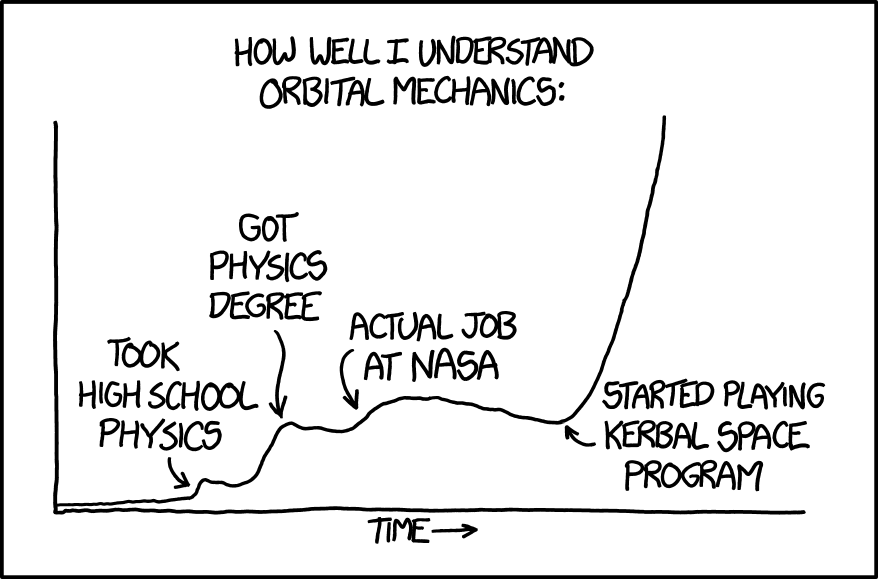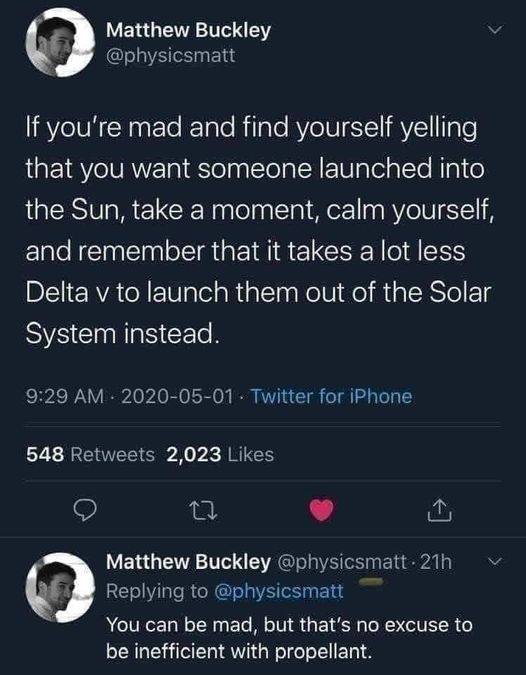Yeah, but propelling them out of the solar system just sounds like the kind of fake-ending that ends up with the super villain coming back stronger in a decade. Have we learnt nothing from science fiction? You have to destroy your foes whilst you can.
Science Memes
Welcome to c/science_memes @ Mander.xyz!
A place for majestic STEMLORD peacocking, as well as memes about the realities of working in a lab.

Rules
- Don't throw mud. Behave like an intellectual and remember the human.
- Keep it rooted (on topic).
- No spam.
- Infographics welcome, get schooled.
This is a science community. We use the Dawkins definition of meme.
Research Committee
Other Mander Communities
Science and Research
Biology and Life Sciences
- [email protected]
- [email protected]
- [email protected]
- [email protected]
- [email protected]
- [email protected]
- [email protected]
- [email protected]
- [email protected]
- [email protected]
- [email protected]
- [email protected]
- [email protected]
- [email protected]
- [email protected]
- [email protected]
- [email protected]
- [email protected]
- [email protected]
- [email protected]
- [email protected]
- [email protected]
- [email protected]
- [email protected]
- !reptiles and [email protected]
Physical Sciences
- [email protected]
- [email protected]
- [email protected]
- [email protected]
- [email protected]
- [email protected]
- [email protected]
- [email protected]
- [email protected]
Humanities and Social Sciences
Practical and Applied Sciences
- !exercise-and [email protected]
- [email protected]
- !self [email protected]
- [email protected]
- [email protected]
- [email protected]
Memes
Miscellaneous
From the https://tvtropes.org/pmwiki/pmwiki.php/Main/EvilOverlordList
4: Shooting is not too good for my enemies.
7: When I've captured my adversary and he says, "Look, before you kill me, will you at least tell me what this is all about?" I'll say, "No." and shoot him. No, on second thought I'll shoot him then say "No."
13: All slain enemies will be cremated, or at least have several rounds of ammunition emptied into them, not Left for Dead at the bottom of the cliff. The announcement of their deaths, as well as any accompanying celebration, will be deferred until after the aforementioned disposal.

The phantom zone ain't gonna cut it.
It blows my mind that this was cutting edge, jaw dropping graphics back in the day. A shape-shifting trapezoid with some panicked faces peeking out.
E. Nah now I'm thinking it's a one dimensional parallelegram.
That shit's laughable, but then there was Superman III and the trauma it caused:

That scene scared the shit out of me
What blows my mind is that I could right now recreate this in moments on a cheap, low-power microcontroller.
They can still come back from another parallel reality or some such - villains are like cats, they always come back (unless they are bored and then they don't).
It's definitely harder to decay the orbit into the sun directly than it is to get to escape velocity. But to play devil's advocate, there is probably a way to get them into the sun while being a similar cost to escape velocity. All you need to do is burn prograde to a super high aphelion, ride all the way out there to Pluto or whatever and then do a small retrograde burn to bring your perihelion inside the sun's photosphere. When you then get back towards the sun years later you would slam into it with a sick velocity that I think would be worth the decades-long wait.
This definitely reads like one of my KSP exploits...
Gravity assist with one of the larger planets to make a very narrow orbit seems to be the most efficient way. But you need the planets to align correctly to have an efficient route.
"I'll launch you into the sun once there is an appropriate transfer window to Jupiter" just doesn't have the same ring to it.
What if we catch a gravity assist off Jool, and do the retrograde burn at perijool to gain some free Oberth Effect DV?
Alternatively you do like the Parker Solar Probe and do 7 Venus flybys, bleeding off a little speed each time with an inverse gravity assist.
Not an expert, but I've read it's easiest to use jupiter to bleed off enough velocity to fall into our sun.
Why is that - wouldn't you be working against solar gravity? Like you don't have to get them there quickly, just launch them in some orbit that will decay and be taken in?
Because the Earth is really cookin', and ~~anything~~ anyone you hurl toward the sun will inherit that orbital velocity as well, meaning that they'll actually end up going around the sun, instead of into it. And due to the speed it would pick up on its way in, it would basically take up a highly-eccentric yet stable elliptical orbit.
"Well, what if we throw them in the other direction, to make up for it?" That's called retrograde, and that's basically exactly what you'd have to do: cancel out the Earth's entire orbital velocity. Which would take a lot of energy, plus a couple of really exacting gravity assists from planets on the way in.
(Edit to add: I may have explained this poorly. Basically, if you don't change your orbital speed at all, any movement you make toward or away from the host body means you just end up in an orbit of the same average distance, but in a more eccentric [elliptical] shape.)
By contrast, even though the escape velocity from the solar system is no slouch (42 km/s), you get to start with the Earth's orbital velocity (30 km/s)--meaning you're already a little under 3/4 of the way there. Plus, if you can make it to Jupiter and Saturn, you can get a significant gravity assist, and they're much bigger targets for such a maneuver than Mercury or Venus are.
So, yeah, bottom line: you only need a delta-V of about 12 km/s to get out of the solar system, but a delta-V of 30 km/s to get to the sun without going into orbit.
That's a great explanation, thanks! 🙏
So, yeah, bottom line: you only need a delta-V of about 12 km/s to get out of the solar system, but a delta-V of 30 km/s to get to the sun without going into orbit.
This is true, but the possibility of gravity assists mostly nullifies the difference. If you can get out to Jupiter you can basically choose: either let it sling you out of the system, or let it cancel out all your orbital velocity so you fall into the sun.
Why would you need to entirely cancel the earths orbital velocity, surely you just need to cancel a ~~tiny~~ bit of orbital velocity?
Edit: https://space.stackexchange.com/questions/43913/do-you-need-0-km-s-velocity-to-crash-into-the-sun
Canceling out only a tiny bit puts you on an orbit similar to earth's. You need to kill basically all of your momentum.
Good question, but if you cancel out only a little bit of orbital velocity, you just orbit in a little bit closer. Without any appreciable drag acting on you, there's nothing that will keep your orbit decaying. You'll just be in a smaller, perhaps slightly more eccentric orbit.
the issue is not counteracting gravity, the issue is decelerating enough to hit the sun
That's the thing - in space, orbits don't decay. Orbital decay only happens if there's dust or atmosphere that you bump into along your orbit to slow you down. But in interplanetary space, there's no dust or atmosphere, and certainly not enough to decay your orbit fast enough to achieve results (otherwise, the Earth would have already decayed and melted in the Sun)
You need to spend fuel to lower your orbit to hit the Sun, and you need to spend fuel to raise your orbit to escape the solar system. It turns out to be really freaking difficult to hit the sun because it simply requires so much fuel to lower your orbit enough to hit the Sun.
Y'all need to pay some Kerbal Space Program. It'll teach you more about orbital mechanics than a physics degree and a job at NASA (according to XKCD). The only problem is, once you have this knowledge, a lot of sci fi becomes annoying.

Launching someone straight into the sun is very very expensive but doing a gravity assist around Jupiter or something to redirect your orbit into the sun is much cheaper.
Huh. I would have thought that once they break orbit that the sun's gravity well would do the heavy ~~lifting~~ pulling.
If you care to learn orbital mechanics, Kerbal Space Program is a great teacher.
"Breaking orbit" still leaves you in almost the same orbit around the sun as the earth. You need to slow down a lot to bring the periapsis of the orbit within the suns surface.
Imagine that you're standing on a train and have a baseball. If you throw the ball off the train, the ball will still have momentum in the direction of the train's movement.
If you want to throw the ball to a friend the train just passed, you have to be able to throw the ball faster than the train is moving or it will never reach them.
The vessel would still have a lot of speed after escaping earth's orbit, so the trajectory would become a large orbit around the sun. You still have to slow down by about ~30km/s (or ~100 000 km/h) to make that orbit intercept with the sun's surface.
once you break out of earth orbit you are now in an orbit around the sun, similar to earths.
I legitimately want to be cremated by the sun after I die. Doesn't matter how long it takes.
When the sun dies it will take the earth with it iirc so if you can wait until then you're good
Don't worry, we all will. We all came from a sun, and will all return to one.
Even with the explanations given here, it's still very counter-intuitive for me.
I think the best thing would be to cut the person in half, send one half towards the sun and the other half out of the solar system.
The issue is that you're starting from earth, and the earth already has a lot of momentum that keeps it from falling into the sun. To get an object from here to the sun you would need to counter the majority of that momentum it already has.
It's not about the propellant, it's about sending a message
Instructions unclear. I'm going to the moon on Delta IX.
(Edit: my dumbass just realized it's ∆V, as in velocity. I thought Delta 5 was the name of a type of chemical propellant. Though now that I think of it, it really should be. Damn, and I work for a space company too. At least I'm just in IT).
Well, I guess this applies to me. I say that a lot.
